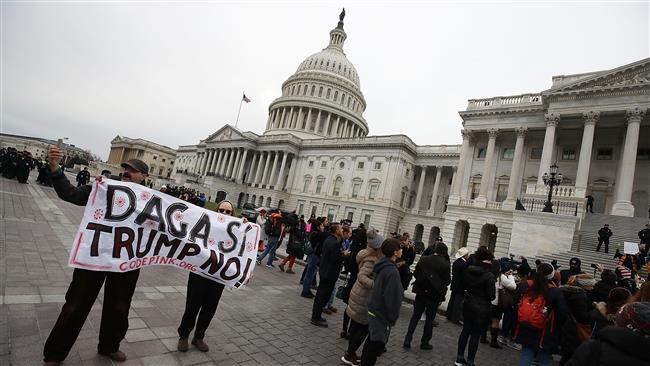GOP senator proposes DACA fix in exchange for tighter border security
US Senator Rob Portman, a Republican from Ohio, has been privately floating a new proposal for a DACA (Deferred Action for Childhood Arrivals) fix that would give legal status, instead of full citizenship, to the program’s recipients in exchange for tighter border security.
The Hill reports Portman’s proposal to end the ongoing standoff with Democrats over immigration would stop short of creating a path to citizenship for the immigrants known as "Dreamers" and help deliver on US Donald President Trump’s promise to build a wall on the US-Mexico border.
“I just have been making the point that for those of us who want to get something done, we haven’t looked at some sort of skinnied-down version” of immigration reform, he said.
“Focus on what’s doable,” he added. “I’ve talked to Democrats and Republicans.”
Portman’s proposal is picking up support among Senate Republicans who want to sidestep a fight with the House and the party’s conservative base over giving Dreamers a 10- or 12-year path to citizenship.
“I’m a fan of that idea,” Senate Republican Conference Chairman John Thune (S.D.) said of Portman’s proposal. “It’s doable,” he also reiterated.
Trump rescinded DACA in September and gave Congress a March 5 deadline to replace it. With the deadline fast approaching, the two parties are still far apart on a deal to protect Dreamers from deportation.
What is DACA?
DACA is an executive action taken by former President Barack Obama that allowed undocumented immigrants who came to the US under the age of 16 to apply for protection from deportation. After a background check, those individuals were able to get renewable two-year permits to work and study in the US, as well.
Since it went into effect in 2012, roughly 800,000 people were protected by the program, and roughly 700,000 had active DACA protections in September, when the Trump administration announced its end.
To be eligible, applicants had to have arrived in the US before age 16 and have lived there since June 15, 2007. They could not have been older than 30 when the Department of Homeland Security enacted the policy in 2012.
Opponents of DACA argue that it rewards illegal immigration.
Iraq exhuming remains of 100 Kurdish women, children killed by Saddam
Panama rejects talks with US over canal control
HTS rulers name al-Qaeda operative as Syria's new spy chief
Iran voices concern about rising insecurity, violence in Syria
VIDEO | Karachi sit-in amplifies nationwide call for justice for Parachinar victims
Iran strongly condemns Israeli bombing of Yemen's civilian infrastructure
VIDEO | Press TV's news headlines
VIDEO | Israel and Iran’s Nuclear Facilities?














 This makes it easy to access the Press TV website
This makes it easy to access the Press TV website